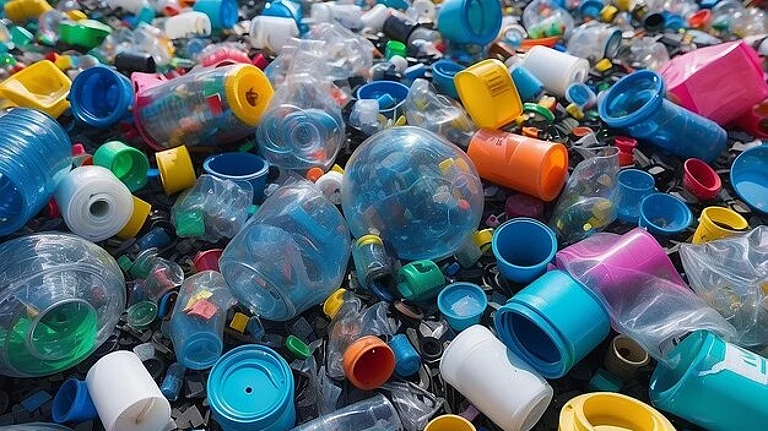Historically, plastic polymers were put to use for packaging applications due to their low cost, light weight, their impervious nature to moisture and the different shapes into which they could be moulded. The idea was to reduce the use of paper in packaging as it was made using forest resources and hence, added to deforestation pressures.
Subsequently, what happened with the overuse of this wonder material is known to everyone. In its end-of-life stage, it became one of the most littered items globally as most countries lacked proper waste segregation, collection and recycling infrastructure. Due to its low weight, it was not attractive for waste collectors to pick up and process for recycling.
India’s Plastic Waste Recycling Plummets, Prompts Urgent Policy Action
A sharp drop in plastic recycling is intensifying India’s struggle with waste, marine litter and sustainable packaging challenges
The littered waste found its way to water bodies and waste disposal sites, causing choking of drains, pollution of water bodies and landfill fires. Research also shows that the littered waste in river systems drains into coastal waters and eventually contributes to marine litter.
Further, around 80% of marine litter is plastic waste. Marine litter has become one of the major reasons for the degradation of marine flora and fauna, including corals.
Tightening Rules
In India, to combat the problems of littering and safe use of plastic packaging, the Plastic Waste Management (PWM) Rules were introduced as far back as 2011. Subsequently, in 2016, the rules were revised and almost every year since then, they have been amended to facilitate collection and recycling of plastic waste.
The central theme of the PMW Rules was the introduction of the concept of Extended Producer Responsibility (EPR), wherein the producers/manufacturers and those who had plastic packaging in their products were assigned responsibility to collect and facilitate the recycling of an equivalent amount of plastic waste that they had put out in the market.
The key feature of the process was the introduction of EPR implementation guidelines and an EPR portal in the State and Central Pollution Control Boards by the nodal ministry—the Ministry of Environment, Forests and Climate Change—to guide producers and manufacturers.
Producers, importers and brand owners (collectively known as PIBOs), along with plastic-waste processors (engaged in plastic recycling, its use as an industrial fuel, including in cement plants, and as low-value plastic waste in road construction) need to register on the EPR portal and provide details about annual plastic-waste collection and processing. This enables the portal to issue plastic-recycling credit certificates to PIBOs.
The PWM Rules, 2016 and subsequent amendments acknowledge the issue of marine litter due to mismanagement of plastic litter, the need to reduce waste generation and enhance waste collection and recycling in line with the waste management hierarchy (reduce, reuse and recycling).
A Growing Crisis
While the policy and regulations regarding plastic waste management in India are robust and in line with international commitments, the reduction in plastic waste recycling rates is a matter of concern. Initial industry estimates suggest that around 60% of collected plastic waste is sent for recycling, but recent trends suggest that recycling rates in recent years are going down to as low as 15–20%.
There is thus a clear need to make sure that a robust collection system is in place to ensure that all the generated plastic waste is collected and preferably sent for recycling. This would essentially require less and less virgin plastic to be produced and be in line with the principles of the circular economy. The situation is critical as plastic waste generation is no longer an urban waste issue but also a significant problem in peri-urban and rural areas.
To address recovery and quality plastic waste as feedstock for recycling or energy recovery, local governments are implementing Material Recovery Facilities (MRFs) that facilitate the collection of dry waste (paper, plastic, glass and metal) and sort and pre-process these into various grades for better recycling of end products.
However, the financial viability of MRFs largely depends on the recyclable waste collected, which often is in conflict with waste removed by waste pickers in any location. Thus, the integration of informal waste pickers with MRF operations is key.
This is also mandated by PWM Rules. Many cities have shown that MRFs can be operated in a financially viable manner if they include informal waste pickers in their workforce as much of the waste sorting at these MRFs is still done manually.
A successful EPR implementation at some stage should also facilitate design changes in packaging to facilitate the use of fewer additives, dyes and hazardous materials for safe recycling into higher value products.
With respect to multilayered plastics (MLPs), the desired multilayer should preferably use the same polymer. Further, manufacturers need to use the same polymer mix to arrive at standardised designs to enable high-quality recyclate, even from MLPs, which as of today are neither economical to collect nor recycle.
Finally, there is also a need to demonstrate degradation of biodegradable packaging alternatives under natural conditions, preferably under anaerobic conditions, to allow recovery of biogas and manure even if they are not recyclable.
The author is Director, Circular Economy and Waste Management Division at The Energy and Resources Institute. (The views expressed are personal.)


